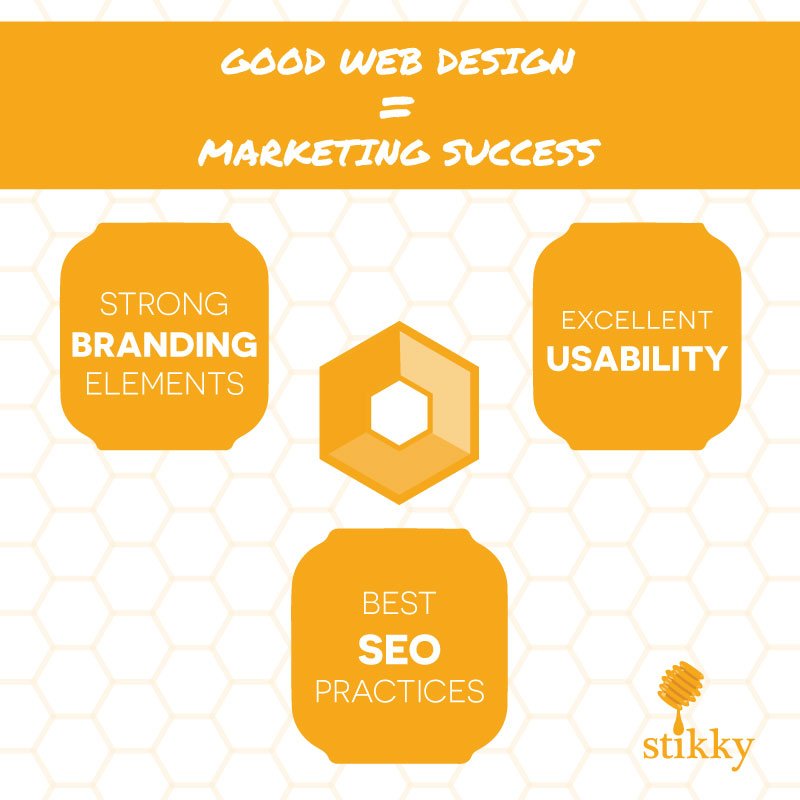We don’t often get to talk about websites and web design on the Stikky Media blog. These subjects are covered on the North Studio blog (which I also manage and write for). But the other day I was having a discussion with Marcus, our digital marketer, about the link between good web design and successful online marketing. In fact, few people realize how much your website influences your marketing results, especially when it comes to SEO.
Good website design is about more than slick interfaces, trendy logos and intuitive menus. Good website design is about having compliant code, no navigation errors and many other backend technical issues that few people outside of developers get to think about.
The foundation under your online marketing house
In general, we recommend to each of our marketing clients to get a professionally designed website if they don’t already have one. This is because we know that effective online marketing campaigns depend on strong branding, good website usability and best SEO practices, among others. Let’s have a look at some of these elements in more detail.
Strong branding
Branding is at the heart of your website. Who’s your audience? What message do you want them to hear? What emotions do you want them to feel? All of this can be transmitted through your website design. When your website branding is strong, it’s easy to follow suit with an excellent online marketing campaign that uses these branding elements.
Since the goal of an online marketing campaign is to bring people to your website, you want a seamless experience between the promotion online and the website visit. If you lack strong branding elements on your website, your visitors are more likely to bounce away.
Good website usability
Web usability is an essential component of web design. Good usability ensures longer stays, deeper engagement and helps with conversion. If you’ve ever visited a very bad site, you know what I mean when I say that most people have no desire to interact with an unusable website.
It’s important to provide a pleasant browsing experience to those who click through your marketing campaign links. Visitors base their first impression of your business on the first few seconds they spend on your website. Do you want to lose them because of bad usability?
Best SEO practices
SEO is a complex topic that deserves several thousand words of content (just look at SEO-specialized blogs, books and webinars). However, we can explain why a good website is helpful for SEO in much fewer words.
The thing you need to know is that SEO is not exclusively based on keywords present in your website’s content. Things like uneditable homepages, 404 errors, image indexing issues and the absence of a site map or a robots.txt file can affect your Google rankings. (Look at Search Engine Land’s SEO Periodic Table for a full description of all SEO factors, on-page and off-page.) Professionally designed websites, however, are built on SEO-friendly platforms like WordPress or Drupal and avoid many of these errors.
Of course, other things can make or break your SEO that has nothing to do with your website backend. Things like keyword stuffing, too many ads and ineffective use of tags and headings can also affect your rankings. But with a good website, you can at least stop worrying about a few SEO ranking factors.
Good design is everything
If you want to understand this from another point of view, Ryan Holmes of HootSuite wrote this article on LinkedIn about how design can make or break your business.

Free website builder vs. professional development

I won’t lie to you and say that all self-built websites are bad. Some people are tech-savvy enough to build a nice website with the help of good themes and a little bit of experimentation. I also won’t lie about how using a free website builder like Wix or Weebly for your business website is probably a bad idea. Aside from the things mentioned above, these websites don’t really have what it takes to promote a strong brand, good web usability or proper SEO.
Yes, website development can be expensive. But these days, your online presence is the first thing most people will come in contact with when they reach out to your business. Do you really want to leave that first impression up to amateurs? Remember that you have about two seconds to impress your visitors–a bad website is enough to have them go to your competitor’s instead.
It’s a little bit like plumbing: if all you have a leaky faucet, you can probably repair it yourself. But when a pipe bursts in your basement, you’re pretty much screwed unless you call a professional. A self-built personal website or blog is fine, since the audience is probably just your family and friends; however, a business website is a whole another deal.
Here’s what a professionally developed website does for you, marketing-wise:
- A clear brand identity
- Eye-catching visual elements that match your brand colors
- Clear navigation paths to lead your visitors through the site
- Consistent page layouts to eliminate confusion
- Easily readable content with clearly identifiable headings, links and other text elements
All of these things work together to make your website attractive at first glance.
But that’s not all
Having a well-designed website is a good first step, but it’s not everything. You must also make sure to have great content (ideally planned through a strategy developed at the same time as your web design) that properly informs your customers about your product or services. But since this post is about professional web design, we won’t dig into the content aspect here.
We love professional website designs because we know they’re an effective marketing tool all by themselves. You can check our portfolio to see our clients; most of them have also had their websites redesigned by North Studio while we were working on their online marketing campaigns.
If you’re a business owner, do you feel strongly about good web design or do you think it’s not as important as I think? If you’re a consumer, how do you react to amateur business websites? To professional ones?








